TL;DR
- Free open-source CRMs cut costs, boost customization, and ensure data ownership for small businesses.
- Highlights: Flatlogic, SuiteCRM, Odoo, EspoCRM, Vtiger, CiviCRM—key features, pros/cons, pricing.
- Example wins: +15% conversions, +20% repeat purchases, 30% faster support via CRM data and automation.
- Choose by needs, integrations, scalability, and TCO; validate with trials, demos, and pilot runs.
Fact Box
- The global CRM market is projected to reach $114.4 billion by 2027, according to Grand View Research.
- In the article's example, CRM use and lead scoring increased a small tech firm's conversion rate by 15%.
- Example: CRM-powered personalized emails drove a 20% rise in repeat purchases at a small e-commerce business.
- Example: Access to full customer history via CRM cut average support resolution time by 30%.
Looking for the perfect free open-source CRM solution for your small business? Keep reading to discover why open-source might be the game-changer you need.
When searching for the best free open-source CRM software, small business owners often ask: What are the benefits of free open-source CRM? How does it compare to proprietary free open-source CRM solutions? Are there any hidden costs or challenges? Can free open-source CRM software meet my business needs? Albert Einstein famously said, “The only source of knowledge is experience.”
The need for effective Customer Relationship Management (CRM) tools is undeniable. According to a study by Grand View Research, the global CRM market size is expected to reach $114.4 billion by 2027, reflecting its critical role in business operations. Small businesses, in particular, face unique challenges that make selecting the right free open-source CRM software crucial for maintaining competitiveness and customer satisfaction. This growing demand highlights the significance of finding a solution that fits small business budgets and requirements.
Trusting the insights in this article is crucial because a seasoned expert with a deep understanding of software development and business management authors it. With over a decade of experience in the software industry and a proven track record in helping businesses implement effective free open-source CRM solutions, I bring a wealth of knowledge and practical insights to the table. My software engineering background ensures a comprehensive perspective on the advantages and pitfalls of various CRM options.
By the end of this article, you will understand the key benefits of using free open-source CRM software for small businesses, how it compares to proprietary options, the potential challenges and how to overcome them, and how to effectively implement and customize open-source CRM software to suit your specific business needs.
Why Small Businesses Need Free Open-Source CRM Software
Running a small business is like juggling flaming swords while riding a unicycle-handling customer interactions, sales, marketing, and service all at once. Free open-source CRM software is your safety net, making sure nothing falls through the cracks.
Enhanced Customer Relationships
CRM software helps you manage and analyze customer interactions and data throughout the customer lifecycle. By centralizing all customer information, small businesses can offer personalized experiences, respond to queries faster, and build stronger relationships. It’s like having a photographic memory for every customer, but better. 
Streamlined Processes and Efficiency
A CRM system automates repetitive tasks, streamlines workflows, and ensures that your team follows best practices. This means less time spent on manual tasks and more time focusing on what matters-growing your business. Efficiency isn’t just a buzzword it’s the difference between surviving and thriving.
Data Organization and Accessibility
Forget about endless spreadsheets and sticky notes. Free open-source CRM software organizes all your customer data in one place, making it easily accessible to your team. Everything is just a click away, whether it’s sales data, customer feedback, or support tickets. Welcome to the 21st century, where your data isn’t a mess.
Example Scenarios of CRM Benefits
Sales: Track Customer Interactions, Manage Leads, and Forecast Sales with Precision
A small business relies heavily on tracking every interaction with potential and current customers to drive sales. Free open-source CRM software centralizes this information, allowing sales teams to:
- Track Customer Interactions: Every email, call, meeting, and follow-up is logged. Sales representatives can quickly pull up a customer’s history before a call, ensuring personalized and informed conversations.
- Manage Leads: Automatically capture leads from various sources-website forms, social media, and email campaigns. Prioritize leads based on predefined criteria, ensuring the hottest leads get attention first.
- Forecast Sales: Use historical data to predict future sales trends. Generate accurate sales forecasts to inform business strategies and inventory management.
Example: A small tech company uses CRM to track interactions with prospects. Sales reps can see the entire communication history, which helps tailor their pitches. They also use lead scoring to focus on the most promising prospects, increasing their conversion rate by 15%.
Marketing: Run Targeted Campaigns Based on Detailed Customer Data and Track Their Effectiveness
CRM systems are invaluable for marketing teams aiming to execute data-driven campaigns:
- Segment Your Audience: Divide your customer base into segments based on demographics, behavior, and purchase history. This ensures marketing messages are relevant to each group.
- Personalize Campaigns: Use customer data to create personalized email campaigns that resonate more with recipients. Personalized emails have higher open and conversion rates.
- Track Campaign Performance: Monitor the effectiveness of marketing campaigns in real-time. Track open rates, click-through rates, and conversions to understand what works and what doesn’t.
Example: A small e-commerce business segments its customer base using CRM data. They run a personalized email campaign targeting frequent buyers with exclusive offers, resulting in a 20% increase in repeat purchases. They also track campaign performance to refine their strategies continuously.
Support: Resolve Issues Faster by Having All Customer Information at Your Fingertips
For support teams, having immediate access to comprehensive customer information is critical:
- Centralized Customer Data: Support agents can quickly access a customer’s purchase history, previous inquiries, and interaction notes. This reduces the time spent searching for information and speeds up issue resolution.
- Automated Ticketing: Automatically create and prioritize support tickets. Assign them to the appropriate agents based on their expertise and workload.
- Track and Analyze Issues: Identify recurring problems and analyze support data to improve products and services. Use insights from support interactions to enhance the overall customer experience.
Example: A small software company uses CRM to manage customer support tickets. When a customer calls with an issue, the support agent can see their entire history, including previous support tickets and product purchases. This context allows the agent to resolve issues more efficiently, reducing the average resolution time by 30%.
Advantages of Free Open-Source CRM Software
When you’re bootstrapping or just starting, every penny counts. Open-source CRM software offers several compelling advantages.
Cost-Effectiveness
The most obvious benefit-it’s free. You don’t need to break the bank to get your hands on a powerful CRM tool. Invest your savings into other critical areas of your business instead.
Customizability and Flexibility
Free open-source CRM systems can be customized to fit your specific business needs. Unlike off-the-shelf solutions, you have the freedom to modify and extend the software as your business grows. It’s like having a tailor-made suit instead of something off the rack.
Community Support and Frequent Updates
Free open-source CRMs have a vibrant community of developers and users who contribute to improving the software. This means regular updates, new features, and robust support-without the hefty price tag.
Ownership and Data Security
With free open-source CRM, you own the software and your data. No more worrying about vendor lock-ins or data privacy issues. You control everything, which is crucial in today’s data-driven world.
Top Free Open-Source CRM Software For Small Businesses
In the bustling world of small business, having the right tools can make all the difference. Customer Relationship Management (CRM) software is essential for organizing customer data, streamlining processes, and driving growth. However, many small businesses operate on tight budgets, making the cost of CRM software a significant concern. Fortunately, there are several powerful, free open-source CRM solutions available. These tools provide robust features without the hefty price tag, offering small businesses the flexibility and control they need. Here’s a look at some of the best free open-source CRM software options for small businesses.
Flatlogic
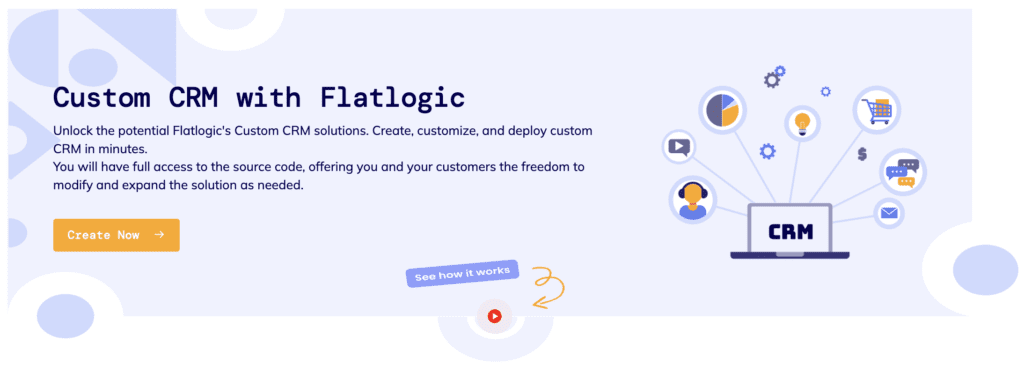
Flatlogic is a powerful, versatile CRM solution for small to medium-sized businesses. It offers a comprehensive suite of tools for managing customer relationships, sales pipelines, and marketing campaigns. Flatlogic’s intuitive interface makes it easy for users to get up and running quickly, and its customizable features allow businesses to tailor the software to their specific needs. Additionally, Flatlogic integrates seamlessly with other business applications, ensuring a smooth workflow across various departments. Its open-source nature provides full control over data and flexibility in deployment.
- Key Features: Sales pipeline management, customer segmentation, email marketing automation, task management, analytics, and reporting.
- Pros: Highly customizable, user-friendly interface, robust feature set, strong integration capabilities, active community support.
- Cons: May require technical expertise for initial setup and customization, and limited advanced features compared to some competitors.
- Pricing: Free and open-source custom pricing for additional support and enterprise features.
SuiteCRM
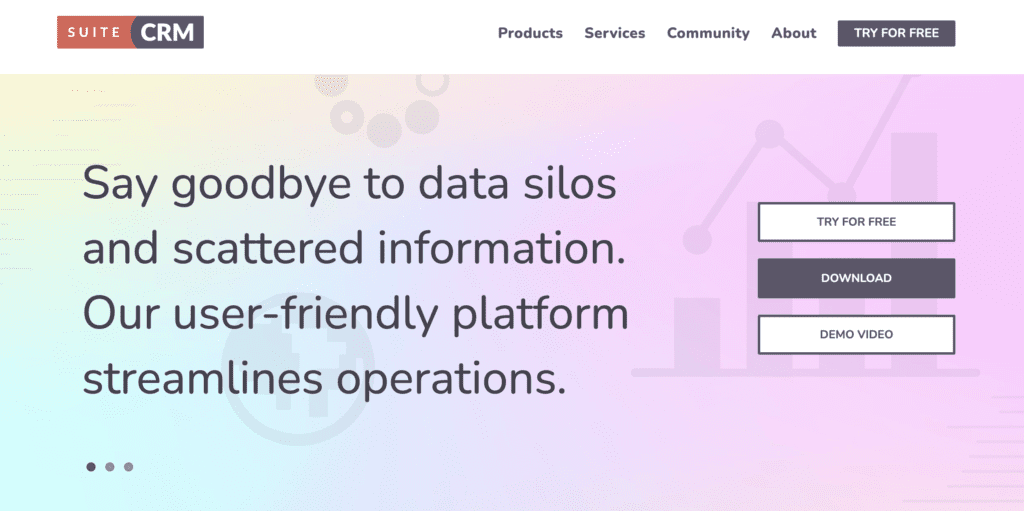
SuiteCRM is an enterprise-grade free open-source CRM solution that is a fork of the popular SugarCRM. It provides extensive features that cover all aspects of customer relationship management, from sales and marketing to customer support. SuiteCRM’s flexibility allows businesses to customize the platform according to their needs, making it suitable for various industries. The software is backed by a vibrant community that continually contributes to its development, ensuring it stays updated with the latest features and security patches. SuiteCRM aims to deliver a robust, scalable CRM solution without the cost associated with proprietary software.
- Key Features: Customizable modules, sales automation, workflow management, reporting, and customer support management.
- Pros: Highly customizable, extensive feature set, strong community support, no licensing fees.
- Cons: Steep learning curve, can be resource-intensive, initial setup can be complex.
- Pricing: Free and open-source optional paid support available.
Odoo
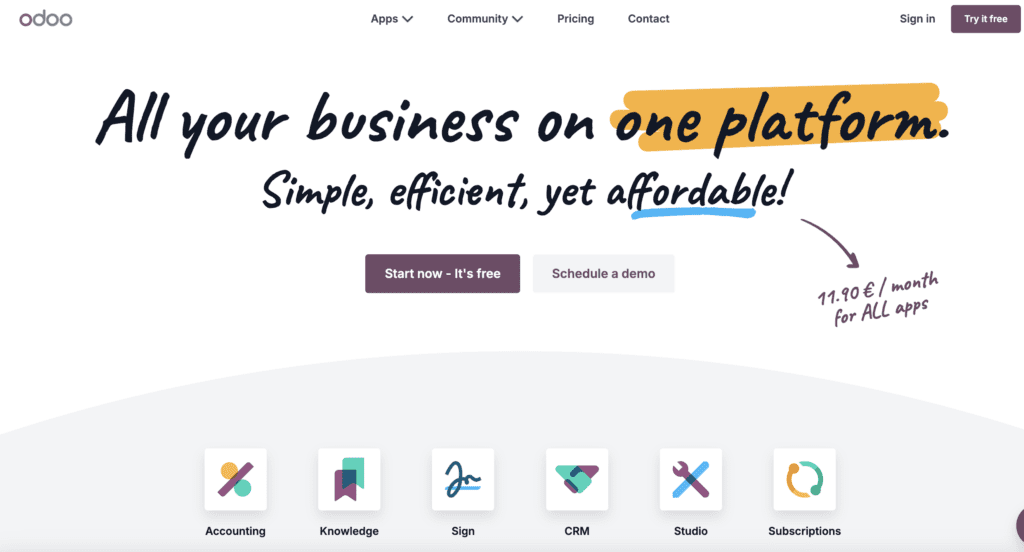
Odoo is an all-in-one business software suite that includes free open-source CRM as one of its core modules. It offers a modular approach, allowing businesses to start with the CRM module and add other functionalities like ERP, project management, and inventory management as needed. Odoo’s user-friendly interface and extensive customization options make it a popular choice for businesses looking for an integrated solution. The software is known for its scalability, making it suitable for both small businesses and larger enterprises. Odoo combines the benefits of open-source software with a comprehensive feature set that covers all business operations.
- Key Features: CRM, ERP integration, marketing automation, sales management, task management.
- Pros: Modular approach, highly scalable, strong integration with other business apps, user-friendly.
- Cons: Some advanced features require payment, can be complex to set up, and may have a learning curve for non-technical users.
- Pricing: Free and open-source core modules additional modules and enterprise features are available with subscription plans.
EspoCRM
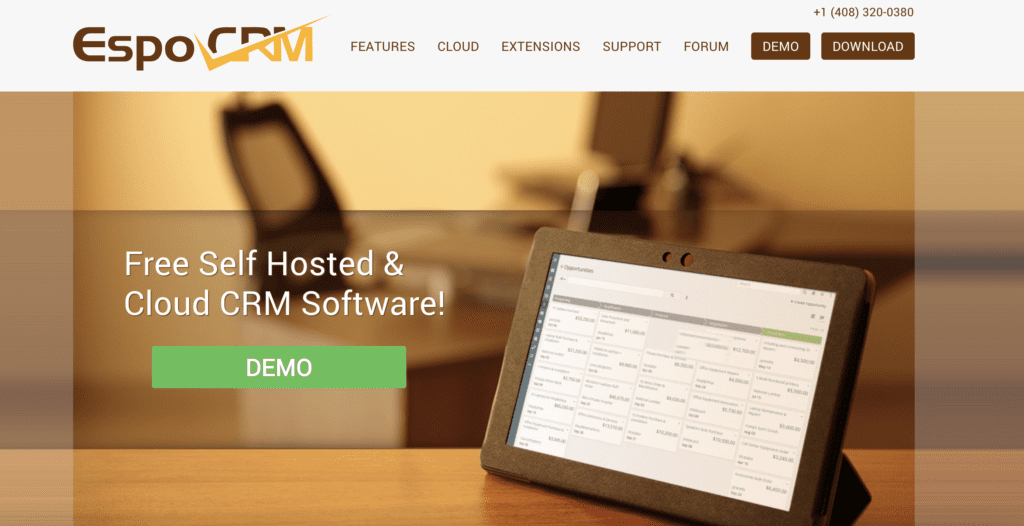
EspoCRM is a lightweight, easy-to-use free open-source CRM solution designed for small to medium-sized businesses. It focuses on delivering essential CRM functionalities without the bloat of unnecessary features, making it accessible and straightforward. EspoCRM offers tools for managing sales, customer interactions, and business processes in a clean and intuitive interface. The highly customizable software allows users to tailor it to their specific needs with minimal effort. Its open-source nature ensures that businesses have full control over their data and can modify the software to fit their unique workflows.
- Key Features: Sales automation, customer management, social media integration, reporting, task management.
- Pros: Easy to use, flexible, lightweight, good for small to medium businesses, straightforward customization.
- Cons: Limited out-of-the-box features compared to more extensive solutions, smaller community.
- Pricing: Free and open-source optional paid support and add-ons available.
Vtiger CRM
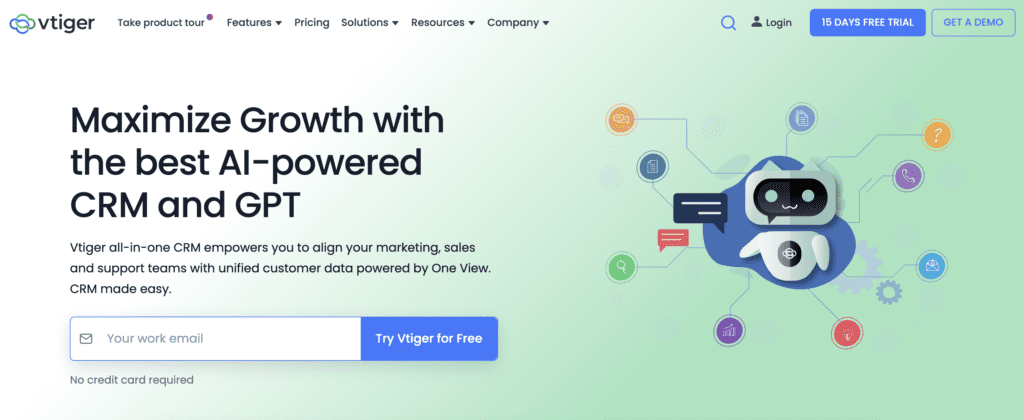
Vtiger CRM is a comprehensive free open-source CRM solution that combines sales, marketing, and support capabilities into a single platform. It aims to provide a unified view of customer interactions and business processes, helping businesses improve efficiency and customer satisfaction. Vtiger’s extensive feature set includes tools for lead management, email marketing, and customer support, making it suitable for businesses of all sizes. The software’s open-source nature allows for extensive customization, ensuring it can meet the specific needs of different industries. Vtiger is designed to enhance collaboration across teams, streamline workflows, and drive business growth.
- Key Features: Sales automation, email marketing, customer support, project management, and reporting.
- Pros: Comprehensive features, strong integration capabilities, customizable, active community.
- Cons: Can be overkill for very small businesses, initial setup can be complex and may require technical expertise.
- Pricing: Free and open-source additional paid versions and support plans available.
CiviCRM
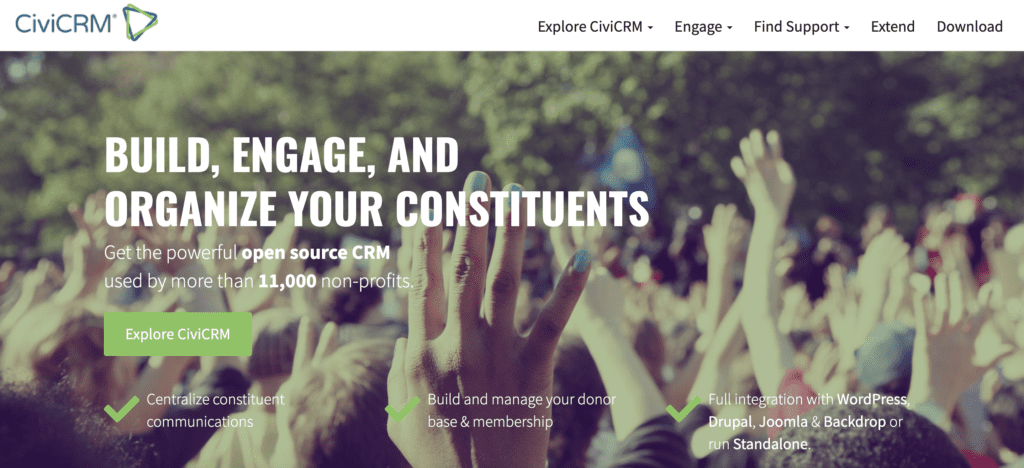
CiviCRM is a free open-source CRM solution tailored for non-profit and civic sector organizations. It offers specialized features for managing contacts, donations, events, memberships, and campaigns, making it an ideal tool for non-profits looking to enhance their operational efficiency. CiviCRM integrates seamlessly with popular content management systems like WordPress, Joomla, and Drupal, providing a robust platform for managing all aspects of a non-profit’s interactions and outreach. Its open-source model ensures that organizations have control over their data and can customize the software to meet their unique requirements.
- Key Features: Contact management, fundraising, event planning, membership management, campaign management.
- Pros: Excellent for non-profits, extensive community support, integrates with popular CMS, customizable.
- Cons: Not ideal for traditional business CRM needs, limited commercial support, can be complex to set up.
- Pricing: Free and open-source optional paid support and extensions available.
How to Choose the Right CRM for Your Business
Choosing the right free open-source CRM can significantly impact your business’s efficiency, customer satisfaction, and growth potential. Here’s a detailed guide to help you make an informed decision.
Assessing Your Business Needs
Before diving into the features and specifications of various CRM solutions, take a step back and evaluate your business needs. Consider the following questions:
- What are your primary goals? Are you focusing on improving sales processes, enhancing customer support, or streamlining marketing efforts?
- What problems are you trying to solve? Identify specific pain points in your current processes that a CRM could address.
- What is your business size and structure? The size of your team and the complexity of your operations will influence your CRM choice.
- What is your budget? Determine how much you are willing to invest in a CRM, keeping in mind that some open-source solutions offer paid support and add-ons.
Evaluating Feature Requirements
Once you have a clear understanding of your business needs, you can start evaluating the features offered by different CRM systems. Here’s what to look for:
- Core CRM Features: Ensure the CRM provides essential functionalities like contact management, sales tracking, and reporting.
- Automation Capabilities: Look for features that automate repetitive tasks, such as email follow-ups and lead assignments.
- Customization Options: The CRM should be flexible enough to adapt to your unique business processes.
- Integration Capabilities: Check if the CRM integrates with your existing tools, such as email clients, accounting software, and marketing platforms.
- User Interface and Experience: A user-friendly interface is crucial for quick adoption and efficient use by your team.
Considering Future Scalability
Your business will (hopefully) grow, and your CRM should grow with it. Consider the scalability of the CRM software:
- User Limits: Ensure the CRM can accommodate an increasing number of users as your team expands.
- Data Storage: Check if the CRM offers sufficient data storage for growing customer databases and historical records.
- Feature Expansion: Look for a CRM that offers additional features or modules that can be added as your needs evolve.
- Performance: Ensure that the CRM can handle increased data volume and user activity without compromising performance.
Integration with Existing Tools and Systems
A CRM doesn’t operate in a vacuum it needs to work seamlessly with your existing tools and systems:
- Email Integration: Ensure the CRM can sync with your email service provider for seamless communication tracking.
- Calendar Integration: The ability to integrate with calendar applications helps in scheduling and tracking meetings and follow-ups.
- Marketing Tools: Look for integration with marketing automation tools for streamlined campaign management.
- Accounting Software: Integration with accounting tools can provide a unified view of financial and customer data.
- APIs and Plugins: Check if the CRM offers APIs or plugins that allow for custom integrations with other software used by your business.
User Training and Support
The best CRM is one that your team will use. Consider the training and support options available:
- Onboarding and Training: Look for CRMs that offer comprehensive onboarding resources, such as tutorials, webinars, and documentation.
- Customer Support: Check the availability and quality of customer support. Some open-source CRMs offer community support, while others provide paid professional support.
- User Community: A vibrant user community can be an invaluable resource for tips, best practices, and troubleshooting.
Evaluating Total Cost of Ownership
While many open-source CRMs are free, there may be additional costs to consider:
- Implementation Costs: Factor in the cost of setting up the CRM, including any necessary hardware or infrastructure.
- Customization and Development: If you need extensive customization, consider the cost of hiring developers.
- Training Costs: Training your team to use the CRM effectively might require an investment in time and resources.
- Ongoing Maintenance: Regular updates, backups, and technical support can incur ongoing costs.
Reviewing User Feedback and Case Studies
Learn from the experiences of other businesses:
- User Reviews: Read reviews from other users to get a sense of the CRM’s strengths and weaknesses.
- Case Studies: Look for case studies or testimonials from businesses similar to yours. This can provide insights into how the CRM performs in real-world scenarios.
- Community Feedback: Engage with online communities and forums to gather firsthand experiences and advice.
Taking Advantage of Free Trials and Demos
Before committing to a CRM, take it for a test drive:
- Free Trials: Many CRM providers offer free trials that allow you to explore the software’s features and usability.
- Demos: Participate in live demos or request a personalized demo to see the CRM in action and ask specific questions.
- Pilot Programs: Implement the CRM on a small scale within your organization to evaluate its effectiveness before a full rollout.
Conclusion
Choosing the right CRM is a strategic decision that can greatly impact your business operations and growth. By thoroughly assessing your needs, evaluating features, considering scalability, ensuring integration, and leveraging user feedback, you can select the right free open-source CRM that aligns with your business goals and helps you build stronger customer relationships.
Flatlogic stands out as a powerful, versatile CRM solution designed specifically for small to medium-sized businesses. With its comprehensive suite of tools, user-friendly interface, and strong integration capabilities, Flatlogic can help you streamline your processes, enhance customer satisfaction, and drive growth. Plus, its open-source nature provides you with full control over your data and flexibility in deployment. Visit Flatlogic to learn more and get started today. Don’t just manage your customer relationships-elevate them with Flatlogic.